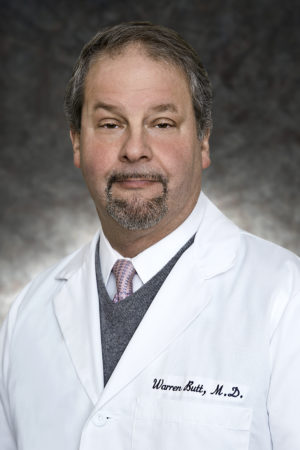GI symposium explores latest treatments for disorders of the digestive system

The inaugural GI symposium Update in Gastrointestinal and Liver Diseases, Oct. 7, brought together national and regional leaders in gastroenterology to discuss the latest treatments for disorders of the digestive system, including Crohn’s disease, inflammatory bowel disease and symptoms of constipation.
“As gastroenterologists, we deal with a whole host of medical conditions, and it’s important that we stay up-to-date for ourselves and our patients,” said Warren Butt, M.D., one of the lead organizers of the event, which was cosponsored by Christiana Care and the Delaware Center for Digestive Care, partners in Delaware GI care.
Within Delaware, there has been enormous progress in the identification and treatment of GI disorders, and the symposium is a method for sharing these accomplishments with the broader medical community while outlining the challenges that remain, Dr. Butt said.
The event attracted nearly 100 clinicians, scientists and allied health professionals for a lively series of presentations at the John H. Ammon Medical Education Center.
Among those addressing procedures now available in Delaware was Wilmington-area gastroenterologist Sarina Pasricha, M.D., MSCR, who shared her expertise on methods for treating constipation.

While statistics on constipation vary, Dr. Pasricha’s research suggests 22 percent of the population seek medical care for constipation, a condition that affects about 42 million Americans, according to the U.S. National Institute of Diabetes and Digestive and Kidney Diseases (NIDDK). Dr. Pasricha said that this number is likely lower than expected because many patients are privately struggling with this personal issue.
“Constipation can be a debilitating disease process that significantly affects a patient’s quality of life, causing him or her to be uncomfortable and potentially even missing work,” she said. “I encourage patients suffering with constipation to talk about it with their health care providers, because we do have medications and treatment options to help.”
She highlighted an advanced procedure — anorectal manometry — that goes beyond a simple physical exam, making it possible for a clinician to more accurately identify the cause of constipation. Anorectal manometry, which requires specialized training, utilizes a balloon-attached catheter to measure internal sensations and identify whether muscles, tissues and nerves in the pelvis are performing as they should, so the specific causes of constipation can be addressed in physical therapy.
“A patient with an abnormal anorectal manometry test can benefit from being referred to a physical therapist for biofeedback for muscles that support the pelvic region,” said Dr. Pasricha. “Research studies have shown that this type of biofeedback can improve colon function and provide symptomatic relief of constipation. By offering this advanced test, we can provide our patients with the best diagnostic and treatment options.”
Another topic discussed was the long-term safety of proton pump inhibitors, which have been linked in news articles with poor mineral absorption, Clostridium difficile bacterial infections and dementia.
National experts Philip Katz, M.D., director of motility at the Weill Cornell Medicine Laboratories and past president of the American College of Gastroenterology, and David Metz, M.D., professor of medicine and associate chief for clinical affairs in the Division of Gastroenterology at the University of Pennsylvania, reported on the safe use of these medications in reducing the amount of acid made by glands in the stomach. They agreed there may be some reason to worry about patients with a history of serious kidney disease and patients at risk for C. diff. However, proton pump inhibitors are overwhelmingly safe and significantly improve a patient’s quality of life. Moreover, evidence for side effects is mostly the result of retrospective studies, and fears about the use of the medications are overblown.
Approaches to celiac disease, an immune system reaction to wheat proteins, and Crohn’s disease, inflammation of the digestive tract, were also discussed. Celiac disease was once considered rare, but there has been a growing diagnosis of the disease in the last 50 years. The autoimmune condition now affects 1 percent of Americans (3 million people), though marketers estimate that 30 percent of the population wants to cut down on gluten, according to Stephanie M. Moleski, M.D., assistant professor of medicine at Thomas Jefferson University.
With Crohn’s disease, treatment involves assessing a patient’s overall inflammation and selecting a therapy that depends on whether a patient is of low or high risk for further disease progression, said Faten N. Aberra, M.D., MSCE, associate professor of medicine at the Hospital of the University of Pennsylvania.
“Based on what we know, the drug infliximab appears to be consistently beneficial,” Dr. Aberra said.
Finally, Neil Nandi, M.D., FACP, director of the Center for Inflammatory Bowel Diseases at Drexel University College of Medicine, spoke on fecal microbiota transplant, a centuries-old technique receiving new interest as an experimental practice because of success in the treatment of C. diff in patients when there are repeated occurrences of the infection. As an example, Dr. Nandi cited a 2012 longitudinal study looking at 77 patients receiving a colonoscopic fecal transplant. The study reported a 91 percent success rate in eliminating C. diff.
In Dr. Butt’s appraisal of the symposium, clinical scenarios of importance to both generalists and specialists were addressed. “We hope today leads to better clinical care, improved education and more effective communication between patients and their providers,” he said.